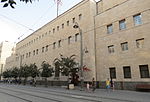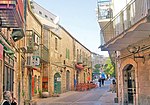Agron House
1969 establishments in IsraelBuildings and structures by Israeli architectsBuildings and structures completed in 1969Buildings and structures in JerusalemLandmarks in Israel

Agron House (Hebrew: בית אגרון, Beit Agron) is a landmark in downtown Jerusalem. Constructed in memory of Gershon Agron, it has housed various Israeli national institutions in pursuit of the arts. It is located at 37 Hillel Street.
Excerpt from the Wikipedia article Agron House (License: CC BY-SA 3.0, Authors, Images).Agron House
Hillel, Jerusalem Nahalat Shiva
Geographical coordinates (GPS) Address Nearby Places Show on map
Geographical coordinates (GPS)
| Latitude | Longitude |
|---|---|
| N 31.779722222222 ° | E 35.221111111111 ° |
Address
BBB
Hillel
9419008 Jerusalem, Nahalat Shiva
Jerusalem District, Israel
Open on Google Maps











